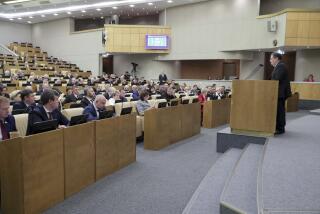Russia to Rescue Soviet State Bank : Economics: Yeltsin says his republic will temporarily absorb the central government’s costs into its own budget. The price in power could be high for Gorbachev.
- Share via
MOSCOW — Russian Federation President Boris N. Yeltsin, moving to resolve a major budget crisis, agreed on Saturday to bail out Soviet President Mikhail S. Gorbachev’s near-bankrupt central government--at a price.
Coming to Gorbachev’s rescue the day after Soviet state bank officials announced that their coffers are empty, Yeltsin said that Russia will guarantee the state loans Gorbachev’s government needs to keep functioning and will merge the central government’s costs into its own budget for the coming quarter.
But the agreement that Gorbachev and Yeltsin struck in an emergency meeting at the Kremlin on Saturday also gave Russia considerably more control over the central Soviet budget, control that is expected to be used to hack away mercilessly at what remains of the Soviet government.
The agreement involves “quite a tough budget,” Yeltsin said.
The Russian president reassured millions of state employees whose pay is jeopardized by the budget crunch that “Soviet people will get their salaries in any case. . . . Russia guarantees that.”
However, official communiques and reports of the meeting indicated that Yeltsin had squeezed consent from Gorbachev for dramatic cuts in the Soviet budget, apparently as part of Russia’s concerted effort to liquidate much of the central government and take over many of its functions.
Russia claimed control on Friday over the operations of the Soviet Foreign Ministry, including its embassies and its Moscow skyscraper, on the grounds that the ministry can no longer afford to run them, and it is still asserting its claim to the Soviet state bank, known as Gosbank.
Concern about the Soviet government’s imminent financial collapse arose last week when Soviet lawmakers, led by Russian Federation deputies, refused to approve a state loan of 90 billion rubles--$159 billion calculated at the official exchange rate--that the government needed to keep functioning.
The Soviet government’s budget deficit is already expected to total at least 200 billion rubles this year--about $360 billion at the official rate.
The state loan in effect amounts to permission for the Soviet state bank to simply print rubles, thus further fueling runaway inflation already estimated to be running at 450% a year.
After Russian deputies blocked the loan, complaining that it would amount to a “blank check” for central authorities, Gosbank Chairman Victor V. Gerashchenko told national television that the bank had stopped all its payments to the Soviet government, raising the threat that the giant governing apparatus would simply grind to a halt.
The Yeltsin-Gorbachev agreement appeared to stave off that danger, and Yeltsin contended that ordinary state employees would never have been left without paychecks anyway. “We said right away that if there are any problems with the union budget, Russia will take fully on itself the payments for the military as well as maintaining science, culture and budget-funded organizations,” Yeltsin said.
The terms of the agreement remained fuzzy, however, and it appeared to depend on consent from the other 11 remaining Soviet republics to guarantee portions of the loan.
“Russia will make certain concessions if the republics will give their guarantees for a union-wide credit,” the official news release on the agreement, distributed by the Tass news agency, said.
It also implied that Russia had agreed to guarantee a state loan only for “minimal, agreed-upon expenses”--not necessarily the entire 90 billion rubles--and only if budgetary policy remains closely coordinated and cuts are made as agreed upon.
And it appeared to require parliamentary approval--no easy task given the current mood in both the Soviet and the Russian Supreme Soviets.
In other economic news, Russian Television reported the dates when it said the Russian government will free prices from state control, allowing them to rocket upward in a risky first step toward a market-driven economy.
Russia will free almost all prices in Moscow, except those for several staple goods, on Dec. 15, according to the unconfirmed television report, and for the rest of the vast republic on Jan 1.
More to Read
Sign up for Essential California
The most important California stories and recommendations in your inbox every morning.
You may occasionally receive promotional content from the Los Angeles Times.










